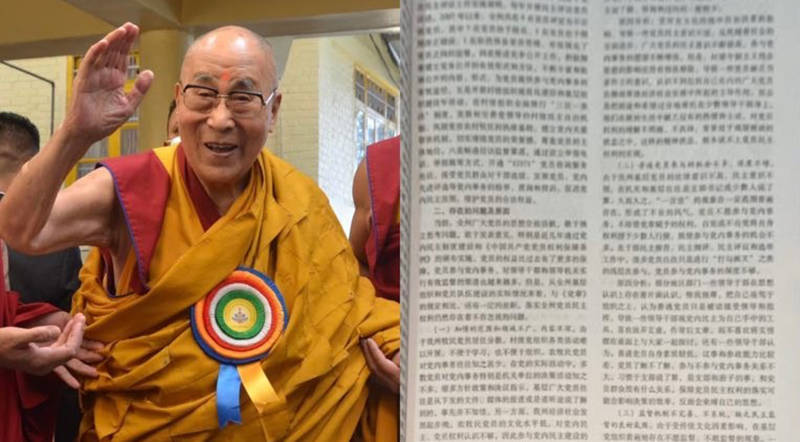Dharamshala – With the frequent occurrence of self-immolations and protests in Tibet, a department of the Chinese Communist Party conducted research into the causes of these and other developments in Tibetan areas. The report stated, “Majority of the instability in Tibet is the result of people's opposition to the improper and corrupt practices of the cadres, which has nothing to do with political issues. The authorities, however, blamed the "Dalai clique" for the incident after the problem was revealed.
According to a report of weiquanwang, in recent years, with the frequent occurrence of unstable incidents such as self-immolations and protests in Tibetan areas, and the steady development of democracy in Tibetan exile communities, the Department of the Communist Party of China (CPC) has conducted research on party democracy, full-fledged people's democracy, and mass democratic supervision in some Tibetan areas.
As per research report of the CCP department written in Chinese states that the Chinese Communist Party (CCP) department has conducted research on "intra-party democracy", "full-fledged people's democracy" and "mass democratic supervision" in some Tibetan areas. But what they found is totally contrary to what the Chinese authorities usually do and say, namely "instabilities and protests in Tibet, including self-immolations caused by the 'Dalai Lama clique'".
The research report of Golog Prefecture, Amdo, eastern Tibet, recognised the difficulties and problems in implementing the so-called comprehensive people's democracy process in Tibet-related areas. The report states, "First of all, the cultural quality of Party members and cadres in agriculture and livestock areas is not high, the basic Party members and cadres do not have a good understanding of the Party's policies on ethnic and religious unification, their active and extensive participation in Party democracy is low, and they do not acknowledge the main role of Party members and cadres in promoting the economic and social development of Guoluo Prefecture."
“The problem of one-sidedness is widespread in the party organisation system in Golog, and in the democratic election of cadres, evaluation, evaluation and election work, the participation of many party members is superficial,” the report added.
“This phenomenon has caused some party members and cadres to have a serious sense of privilege, putting themselves above the party organisation, unwilling to bring the real situation in Tibetan areas to the meeting to discuss with the cadres and masses in a factual manner, and even unwilling to accept the supervision of other party members, who put forward their opinions, the party members who put forward their opinions will be subjected to retaliation, and over time, causing the ethnic and religious problems in Tibetan areas to intensify. The authorities, however, blamed the "Dalai clique" for the incident after the problem came to light,” the research report stated.
The Chinese communist government used to blame the unrest, protests and self-immolations against the Chinese government's repressive policies in Tibet on the exiled Tibetan spiritual leader, His Holiness the Dalai Lama, and the exiled Tibetan government. His Holiness the Dalai Lama has always told the Chinese authorities to face the real problems of Tibetans and solve them. Today, they seem to be looking for the root cause of the incidents: the violation of human rights, the lack of freedom of religion, language and expression, etc. in Tibet.
The rights and privileges of people mentioned in China's constitution and policies are only superficial and are not put into practice in real life.


![Tibet has a rich history as a sovereign nation until the 1950s when it was invaded by China. [Photo: File]](/images/stories/Pics-2024/March/Tibet-Nation-1940s.jpg#joomlaImage://local-images/stories/Pics-2024/March/Tibet-Nation-1940s.jpg?width=1489&height=878)


















